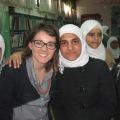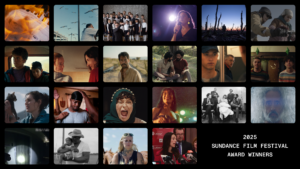Laura Nix, Director, The Light In Her Eyes
The Baqa’a camp, home to 104,000 people Palestinian refugees, is about 40 minutes outside of Amman. Administered by the United Nations, it was created in 1948 and is one of 13 camps for the close to two million Palestinian refugees who live in Jordan. It’s called a camp, but unlike what one might expect, it’s not filled with tents. Instead it looks like a low-income suburb one might see outside of many cities, with plain concrete buildings and splashes of graffiti.
We’re there to screen The Light In Her Eyes for a class at an all-girls school for 9th and 10th graders. In front of the school, girls around age 14-15 are playing soccer outside. They wear matching green uniforms and white hijab (headscarf). Inside the main entrance the sound of their voices and laughter fills the hallways as they run up and down the stairs and goof around. When they see our group they immediately run over and start asking lots of questions “Where you from? Facebook? Twitter? You like Lord of the Rings? Gandalf? Titanic?” I don’t know if Gandalf is what Film Forward had in mind when they created this program for cultural dialogue. But I’m happy to discuss anything.
The teachers pack 60 girls into a classroom for the screening. I watch everyone take their seats and I’m struck by how much these girls feel like the girls at Houda’s school (Houda is the main character in our film who leads a Qur’an school for girls in Syria) – their warmth and affection for each other, their hand gestures.
We start the film, and I realize I’m pretty nervous. It feels like I’m showing the film to Houda’s students even though I know I’m hardly in Damascus. They’re fidgety as they watch, but they seem captivated. I realize they probably have not seen a film about girls similar to themselves before, and are most likely hungry for those images, voices and characters. It’s not the same country, nor the same context, but there are many parallels between their values and interests and those of their Syrian peers.
The film finishes and they can’t get their words out fast enough. With help of our translator Fayyad, I begin to hear their questions and comments: they want to thank me for the film’s positive image of Islam, why did we make the film, and did our government try to stop us from showing it? One girl says you can see in the film how one educated woman can make a difference in her family for generations. We talk about the obstacles girls face to get an education worldwide. I ask them, what are the obstacles girls face here? They answer in unison, “early marriage.” Their principal mentions they are teaching a workshop for their mothers that very day on early marriage, educating their mothers on how and why to say no to requests for their daughter’s hand if she’s too young. One girl says she disagrees with the men in the film who say women’s place is in the home. She wants to have a balance between work and family. I tell her I agree that this is an issue women struggle with all over the world.
We finish with hugs and photos and I feel elated. The principal tells us she’s never seen the girls this engaged before. They usually never ask so many questions, nor participate so actively in a discussion. As a filmmaker you try very hard to reach your ideal audience, and at the screening today I think we actually did. All the challenges of making the film suddenly feel worthwhile. It’s one of those rare moments when I have the opportunity to remember why I became a filmmaker in the first place.




